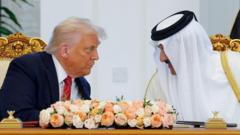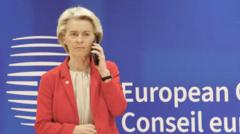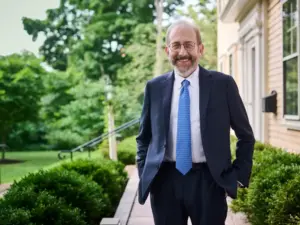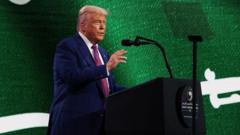Musk's White House debut raises questions about his influence and cost-cutting strategies, amidst political pushback and legal hurdles.
**Elon Musk Enters White House Spotlight: Denies Hostile Takeover Allegations**
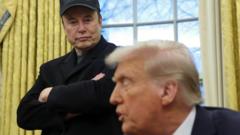
**Elon Musk Enters White House Spotlight: Denies Hostile Takeover Allegations**
Elon Musk faces scrutiny over new federal cuts as he embarks on radical government reforms.
In a surprising appearance at the White House, Elon Musk addressed accusations of leading a "hostile takeover" of the U.S. government while promoting his strategies for federal cost reduction. As the richest man globally, Musk stood alongside President Donald Trump, who has charged him with streamlining federal operations and slashing spending.
During a press conference held in the Oval Office, Musk defended his proposed measures as reasonable steps that align with voter desires for government reform. "The people voted for major government reform, and that's what they will receive," he stated, underlining the essence of democracy. Despite his appointed role, he characterized federal workers as an "unelected, fourth, unconstitutional branch of government," asserting their undue influence compared to elected officials.
Wearing a distinctive Make America Great Again cap and accompanied by his young son, Musk emphasized the necessity of reducing federal expenditures for the nation's financial health. He responded to a recent misinformation incident involving U.S. government aid to Gaza with humility, admitting inaccuracies in some statements he made.
Musk's efforts to reshape government spending include his newly established Department of Government Efficiency (Doge), which has faced significant opposition from Democratic lawmakers who accuse it of lacking transparency and operating in secrecy. Senator Chuck Schumer criticized Doge's broad authority, describing it as an "unelected shadow government" attempting to seize control over federal operations. He warned against efforts to include language in spending bills that could constrain Musk's operations.
However, Trump voiced unwavering support for Musk's endeavors, highlighting the search for what he called "fraud and abuse" in federal spending, a claim that sparked skepticism due to a lack of presented evidence. The administration forecasted uncovering over $1 trillion in alleged wasteful spending, amid ongoing legal challenges to the proposed spending cuts.
As the Trump administration delves into government efficiency, the plan includes substantial workforce reductions, with an executive order signed to regulate hiring and potentially furlough large segments of the federal staff. Public sentiment appears mixed: while some polls indicate support for Musk's initiatives among Republicans, there is concern over the scale of his influence and the jobs at stake, especially at agencies like the U.S. Agency for International Development (USAID), which has begun to see staff reductions.
The ongoing political divide around Musk's initiatives has highlighted broader concerns regarding executive power and the implications of concentrated authority in the hands of an unelected official. Critics have urged vigilance, arguing that Musk stands to gain personally from certain government changes, threatening the ideals of accountability and governance.
As Musk navigates his pivotal role within the Trump administration, the future of federal spending reform remains uncertain, marked by polarized public opinion and persistent legal obstacles.
During a press conference held in the Oval Office, Musk defended his proposed measures as reasonable steps that align with voter desires for government reform. "The people voted for major government reform, and that's what they will receive," he stated, underlining the essence of democracy. Despite his appointed role, he characterized federal workers as an "unelected, fourth, unconstitutional branch of government," asserting their undue influence compared to elected officials.
Wearing a distinctive Make America Great Again cap and accompanied by his young son, Musk emphasized the necessity of reducing federal expenditures for the nation's financial health. He responded to a recent misinformation incident involving U.S. government aid to Gaza with humility, admitting inaccuracies in some statements he made.
Musk's efforts to reshape government spending include his newly established Department of Government Efficiency (Doge), which has faced significant opposition from Democratic lawmakers who accuse it of lacking transparency and operating in secrecy. Senator Chuck Schumer criticized Doge's broad authority, describing it as an "unelected shadow government" attempting to seize control over federal operations. He warned against efforts to include language in spending bills that could constrain Musk's operations.
However, Trump voiced unwavering support for Musk's endeavors, highlighting the search for what he called "fraud and abuse" in federal spending, a claim that sparked skepticism due to a lack of presented evidence. The administration forecasted uncovering over $1 trillion in alleged wasteful spending, amid ongoing legal challenges to the proposed spending cuts.
As the Trump administration delves into government efficiency, the plan includes substantial workforce reductions, with an executive order signed to regulate hiring and potentially furlough large segments of the federal staff. Public sentiment appears mixed: while some polls indicate support for Musk's initiatives among Republicans, there is concern over the scale of his influence and the jobs at stake, especially at agencies like the U.S. Agency for International Development (USAID), which has begun to see staff reductions.
The ongoing political divide around Musk's initiatives has highlighted broader concerns regarding executive power and the implications of concentrated authority in the hands of an unelected official. Critics have urged vigilance, arguing that Musk stands to gain personally from certain government changes, threatening the ideals of accountability and governance.
As Musk navigates his pivotal role within the Trump administration, the future of federal spending reform remains uncertain, marked by polarized public opinion and persistent legal obstacles.







